Entrepreneurship and Small Business Management Report - BUS101
VerifiedAdded on 2021/02/21
|15
|3716
|39
Report
AI Summary
This report delves into the multifaceted world of entrepreneurship and small business management. It begins by defining entrepreneurship and its role in fostering economic stability, followed by an examination of various entrepreneurial ventures, including small businesses, large enterprises, and social enterprises, alongside their respective typologies. The report then analyzes the similarities and differences between these ventures, highlighting their scales, purposes, and characteristics. A significant portion is dedicated to interpreting data and assessing the impact of small and micro businesses on the UK economy, emphasizing their contributions to job creation, revenue generation, and infrastructure development. The importance of small businesses and startups in driving social economy growth is also discussed, including their role in job creation and improving living standards. Furthermore, the report identifies and differentiates the characteristics, skills, and traits of successful entrepreneurs, such as self-efficacy, passion, and innovative reasoning, setting them apart from traditional business managers. The report also explores how an entrepreneur's background and experiences can either foster or hinder their entrepreneurial journey. The report concludes by summarizing the key findings and emphasizing the significance of entrepreneurship in driving economic growth and social welfare.

ENTREPRENEURSHIP AND
SMALL BUSINESS
MANAGEMENT
SMALL BUSINESS
MANAGEMENT
Paraphrase This Document
Need a fresh take? Get an instant paraphrase of this document with our AI Paraphraser
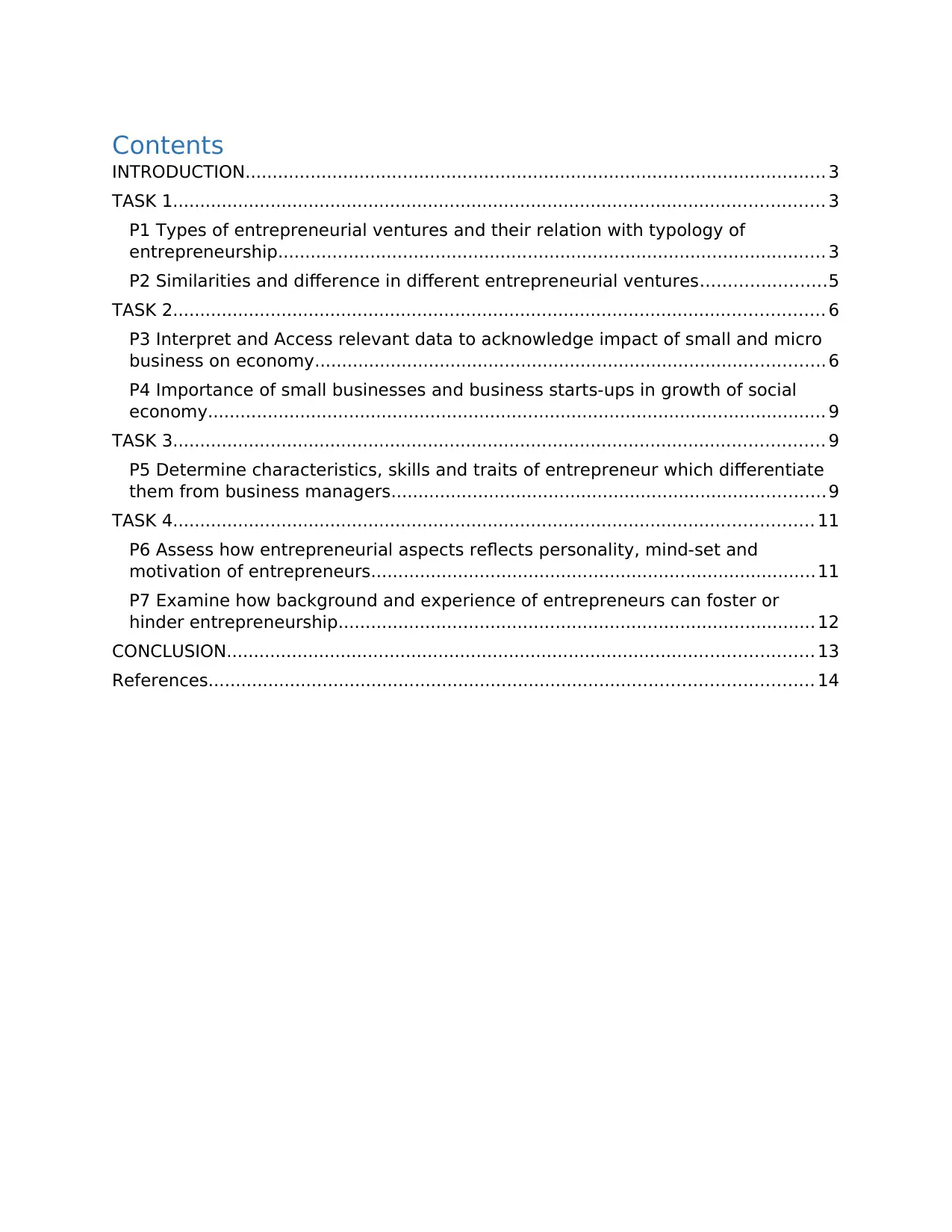
Contents
INTRODUCTION........................................................................................................... 3
TASK 1........................................................................................................................ 3
P1 Types of entrepreneurial ventures and their relation with typology of
entrepreneurship..................................................................................................... 3
P2 Similarities and difference in different entrepreneurial ventures.......................5
TASK 2........................................................................................................................ 6
P3 Interpret and Access relevant data to acknowledge impact of small and micro
business on economy.............................................................................................. 6
P4 Importance of small businesses and business starts-ups in growth of social
economy.................................................................................................................. 9
TASK 3........................................................................................................................ 9
P5 Determine characteristics, skills and traits of entrepreneur which differentiate
them from business managers................................................................................9
TASK 4...................................................................................................................... 11
P6 Assess how entrepreneurial aspects reflects personality, mind-set and
motivation of entrepreneurs..................................................................................11
P7 Examine how background and experience of entrepreneurs can foster or
hinder entrepreneurship........................................................................................ 12
CONCLUSION............................................................................................................ 13
References............................................................................................................... 14
INTRODUCTION........................................................................................................... 3
TASK 1........................................................................................................................ 3
P1 Types of entrepreneurial ventures and their relation with typology of
entrepreneurship..................................................................................................... 3
P2 Similarities and difference in different entrepreneurial ventures.......................5
TASK 2........................................................................................................................ 6
P3 Interpret and Access relevant data to acknowledge impact of small and micro
business on economy.............................................................................................. 6
P4 Importance of small businesses and business starts-ups in growth of social
economy.................................................................................................................. 9
TASK 3........................................................................................................................ 9
P5 Determine characteristics, skills and traits of entrepreneur which differentiate
them from business managers................................................................................9
TASK 4...................................................................................................................... 11
P6 Assess how entrepreneurial aspects reflects personality, mind-set and
motivation of entrepreneurs..................................................................................11
P7 Examine how background and experience of entrepreneurs can foster or
hinder entrepreneurship........................................................................................ 12
CONCLUSION............................................................................................................ 13
References............................................................................................................... 14
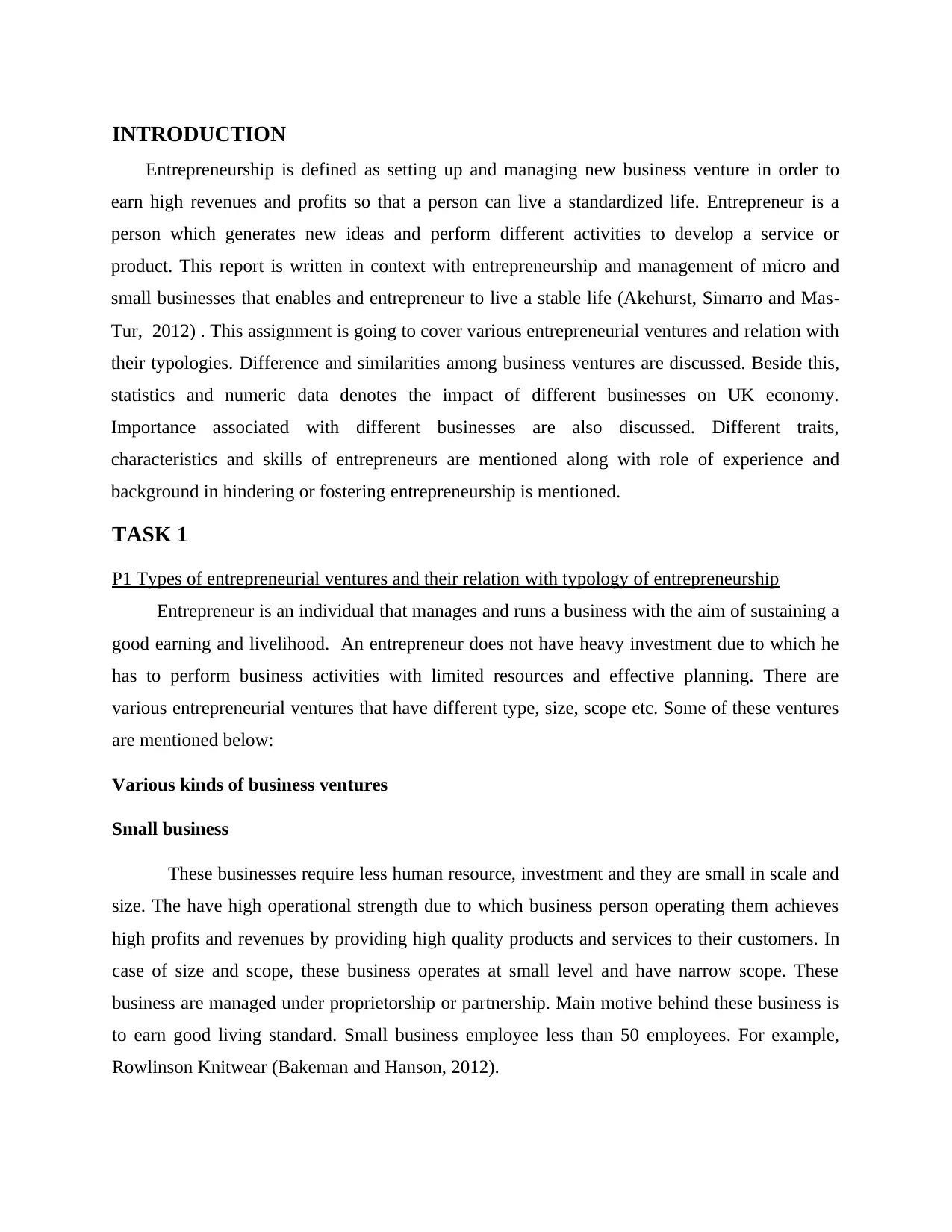
INTRODUCTION
Entrepreneurship is defined as setting up and managing new business venture in order to
earn high revenues and profits so that a person can live a standardized life. Entrepreneur is a
person which generates new ideas and perform different activities to develop a service or
product. This report is written in context with entrepreneurship and management of micro and
small businesses that enables and entrepreneur to live a stable life (Akehurst, Simarro and Mas‐
Tur, 2012) . This assignment is going to cover various entrepreneurial ventures and relation with
their typologies. Difference and similarities among business ventures are discussed. Beside this,
statistics and numeric data denotes the impact of different businesses on UK economy.
Importance associated with different businesses are also discussed. Different traits,
characteristics and skills of entrepreneurs are mentioned along with role of experience and
background in hindering or fostering entrepreneurship is mentioned.
TASK 1
P1 Types of entrepreneurial ventures and their relation with typology of entrepreneurship
Entrepreneur is an individual that manages and runs a business with the aim of sustaining a
good earning and livelihood. An entrepreneur does not have heavy investment due to which he
has to perform business activities with limited resources and effective planning. There are
various entrepreneurial ventures that have different type, size, scope etc. Some of these ventures
are mentioned below:
Various kinds of business ventures
Small business
These businesses require less human resource, investment and they are small in scale and
size. The have high operational strength due to which business person operating them achieves
high profits and revenues by providing high quality products and services to their customers. In
case of size and scope, these business operates at small level and have narrow scope. These
business are managed under proprietorship or partnership. Main motive behind these business is
to earn good living standard. Small business employee less than 50 employees. For example,
Rowlinson Knitwear (Bakeman and Hanson, 2012).
Entrepreneurship is defined as setting up and managing new business venture in order to
earn high revenues and profits so that a person can live a standardized life. Entrepreneur is a
person which generates new ideas and perform different activities to develop a service or
product. This report is written in context with entrepreneurship and management of micro and
small businesses that enables and entrepreneur to live a stable life (Akehurst, Simarro and Mas‐
Tur, 2012) . This assignment is going to cover various entrepreneurial ventures and relation with
their typologies. Difference and similarities among business ventures are discussed. Beside this,
statistics and numeric data denotes the impact of different businesses on UK economy.
Importance associated with different businesses are also discussed. Different traits,
characteristics and skills of entrepreneurs are mentioned along with role of experience and
background in hindering or fostering entrepreneurship is mentioned.
TASK 1
P1 Types of entrepreneurial ventures and their relation with typology of entrepreneurship
Entrepreneur is an individual that manages and runs a business with the aim of sustaining a
good earning and livelihood. An entrepreneur does not have heavy investment due to which he
has to perform business activities with limited resources and effective planning. There are
various entrepreneurial ventures that have different type, size, scope etc. Some of these ventures
are mentioned below:
Various kinds of business ventures
Small business
These businesses require less human resource, investment and they are small in scale and
size. The have high operational strength due to which business person operating them achieves
high profits and revenues by providing high quality products and services to their customers. In
case of size and scope, these business operates at small level and have narrow scope. These
business are managed under proprietorship or partnership. Main motive behind these business is
to earn good living standard. Small business employee less than 50 employees. For example,
Rowlinson Knitwear (Bakeman and Hanson, 2012).
⊘ This is a preview!⊘
Do you want full access?
Subscribe today to unlock all pages.

Trusted by 1+ million students worldwide
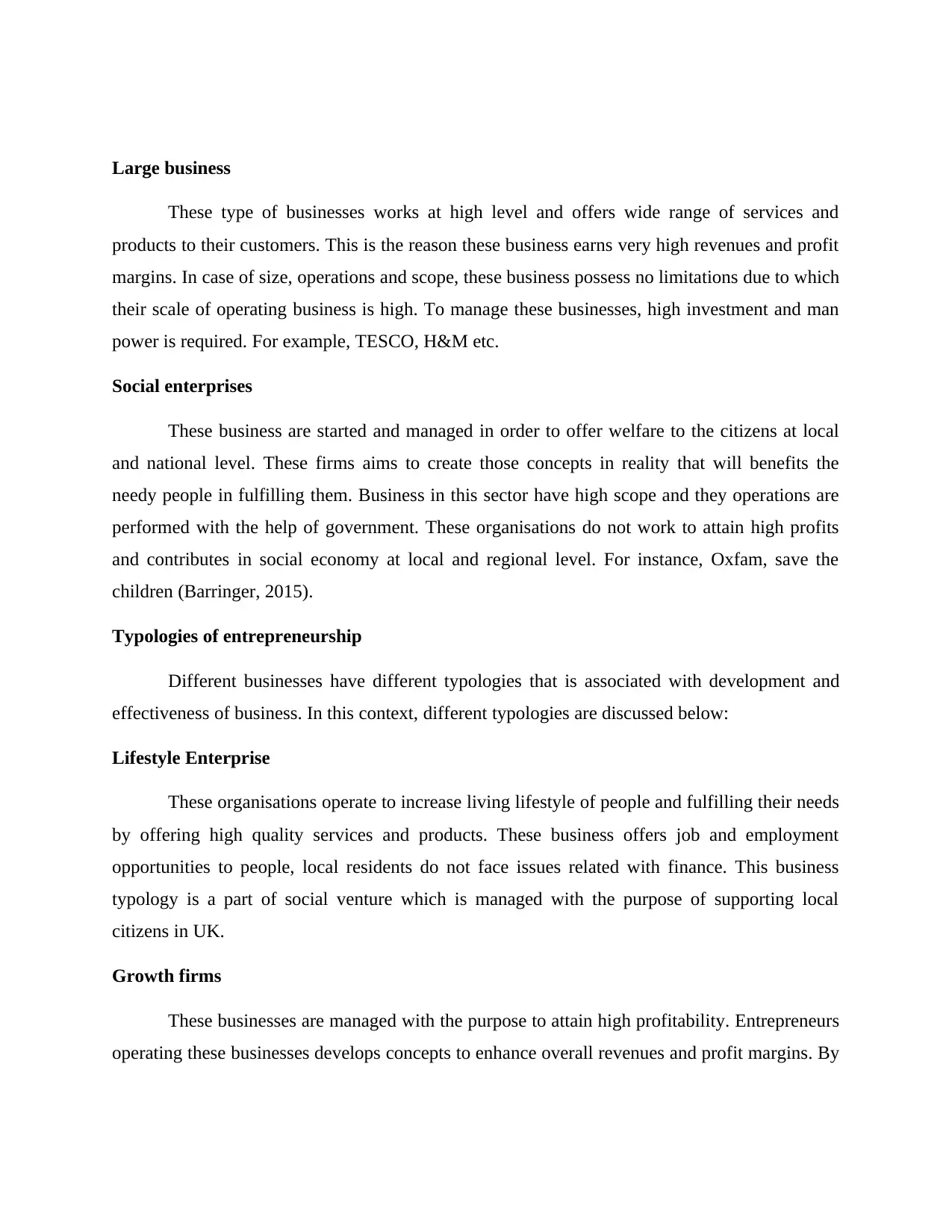
Large business
These type of businesses works at high level and offers wide range of services and
products to their customers. This is the reason these business earns very high revenues and profit
margins. In case of size, operations and scope, these business possess no limitations due to which
their scale of operating business is high. To manage these businesses, high investment and man
power is required. For example, TESCO, H&M etc.
Social enterprises
These business are started and managed in order to offer welfare to the citizens at local
and national level. These firms aims to create those concepts in reality that will benefits the
needy people in fulfilling them. Business in this sector have high scope and they operations are
performed with the help of government. These organisations do not work to attain high profits
and contributes in social economy at local and regional level. For instance, Oxfam, save the
children (Barringer, 2015).
Typologies of entrepreneurship
Different businesses have different typologies that is associated with development and
effectiveness of business. In this context, different typologies are discussed below:
Lifestyle Enterprise
These organisations operate to increase living lifestyle of people and fulfilling their needs
by offering high quality services and products. These business offers job and employment
opportunities to people, local residents do not face issues related with finance. This business
typology is a part of social venture which is managed with the purpose of supporting local
citizens in UK.
Growth firms
These businesses are managed with the purpose to attain high profitability. Entrepreneurs
operating these businesses develops concepts to enhance overall revenues and profit margins. By
These type of businesses works at high level and offers wide range of services and
products to their customers. This is the reason these business earns very high revenues and profit
margins. In case of size, operations and scope, these business possess no limitations due to which
their scale of operating business is high. To manage these businesses, high investment and man
power is required. For example, TESCO, H&M etc.
Social enterprises
These business are started and managed in order to offer welfare to the citizens at local
and national level. These firms aims to create those concepts in reality that will benefits the
needy people in fulfilling them. Business in this sector have high scope and they operations are
performed with the help of government. These organisations do not work to attain high profits
and contributes in social economy at local and regional level. For instance, Oxfam, save the
children (Barringer, 2015).
Typologies of entrepreneurship
Different businesses have different typologies that is associated with development and
effectiveness of business. In this context, different typologies are discussed below:
Lifestyle Enterprise
These organisations operate to increase living lifestyle of people and fulfilling their needs
by offering high quality services and products. These business offers job and employment
opportunities to people, local residents do not face issues related with finance. This business
typology is a part of social venture which is managed with the purpose of supporting local
citizens in UK.
Growth firms
These businesses are managed with the purpose to attain high profitability. Entrepreneurs
operating these businesses develops concepts to enhance overall revenues and profit margins. By
Paraphrase This Document
Need a fresh take? Get an instant paraphrase of this document with our AI Paraphraser
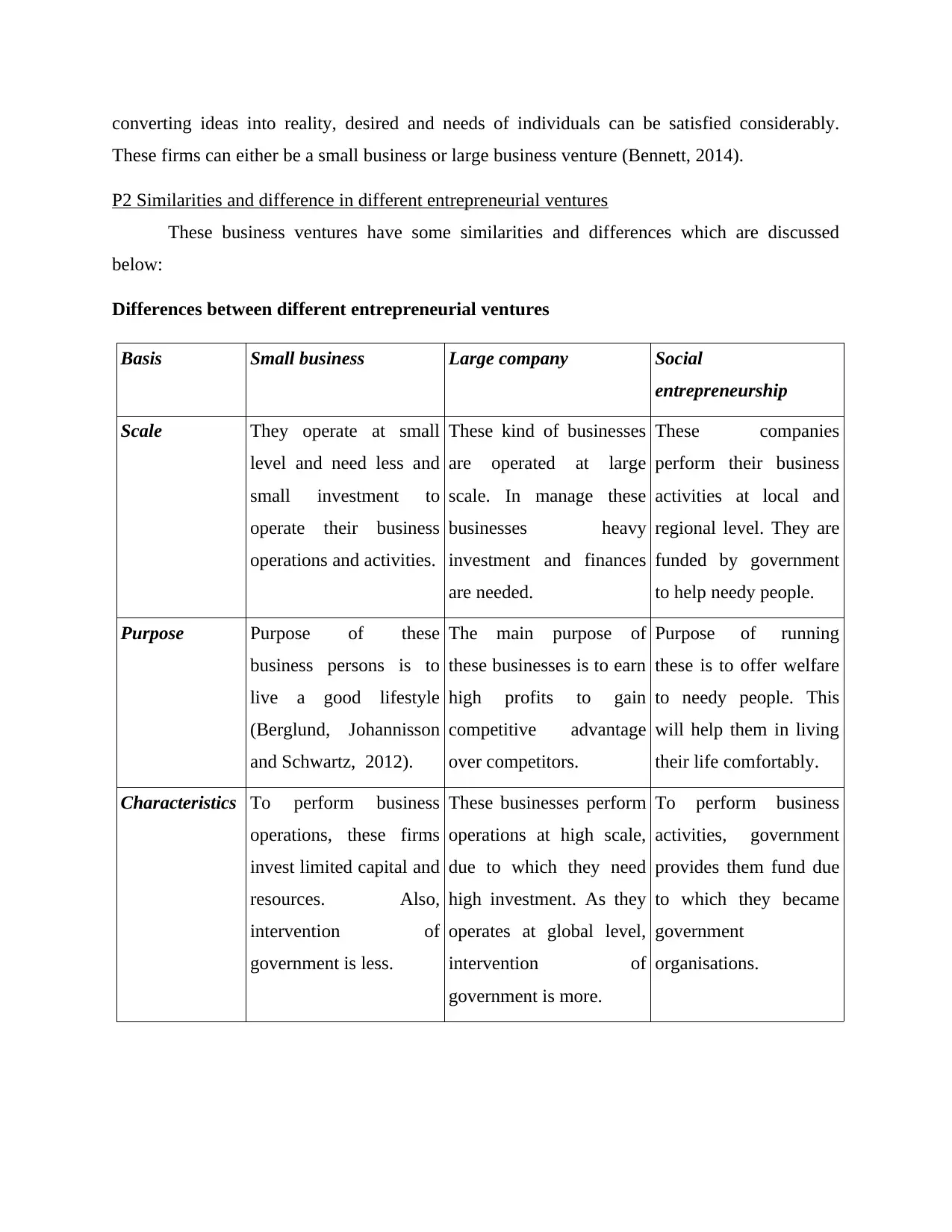
converting ideas into reality, desired and needs of individuals can be satisfied considerably.
These firms can either be a small business or large business venture (Bennett, 2014).
P2 Similarities and difference in different entrepreneurial ventures
These business ventures have some similarities and differences which are discussed
below:
Differences between different entrepreneurial ventures
Basis Small business Large company Social
entrepreneurship
Scale They operate at small
level and need less and
small investment to
operate their business
operations and activities.
These kind of businesses
are operated at large
scale. In manage these
businesses heavy
investment and finances
are needed.
These companies
perform their business
activities at local and
regional level. They are
funded by government
to help needy people.
Purpose Purpose of these
business persons is to
live a good lifestyle
(Berglund, Johannisson
and Schwartz, 2012).
The main purpose of
these businesses is to earn
high profits to gain
competitive advantage
over competitors.
Purpose of running
these is to offer welfare
to needy people. This
will help them in living
their life comfortably.
Characteristics To perform business
operations, these firms
invest limited capital and
resources. Also,
intervention of
government is less.
These businesses perform
operations at high scale,
due to which they need
high investment. As they
operates at global level,
intervention of
government is more.
To perform business
activities, government
provides them fund due
to which they became
government
organisations.
These firms can either be a small business or large business venture (Bennett, 2014).
P2 Similarities and difference in different entrepreneurial ventures
These business ventures have some similarities and differences which are discussed
below:
Differences between different entrepreneurial ventures
Basis Small business Large company Social
entrepreneurship
Scale They operate at small
level and need less and
small investment to
operate their business
operations and activities.
These kind of businesses
are operated at large
scale. In manage these
businesses heavy
investment and finances
are needed.
These companies
perform their business
activities at local and
regional level. They are
funded by government
to help needy people.
Purpose Purpose of these
business persons is to
live a good lifestyle
(Berglund, Johannisson
and Schwartz, 2012).
The main purpose of
these businesses is to earn
high profits to gain
competitive advantage
over competitors.
Purpose of running
these is to offer welfare
to needy people. This
will help them in living
their life comfortably.
Characteristics To perform business
operations, these firms
invest limited capital and
resources. Also,
intervention of
government is less.
These businesses perform
operations at high scale,
due to which they need
high investment. As they
operates at global level,
intervention of
government is more.
To perform business
activities, government
provides them fund due
to which they became
government
organisations.
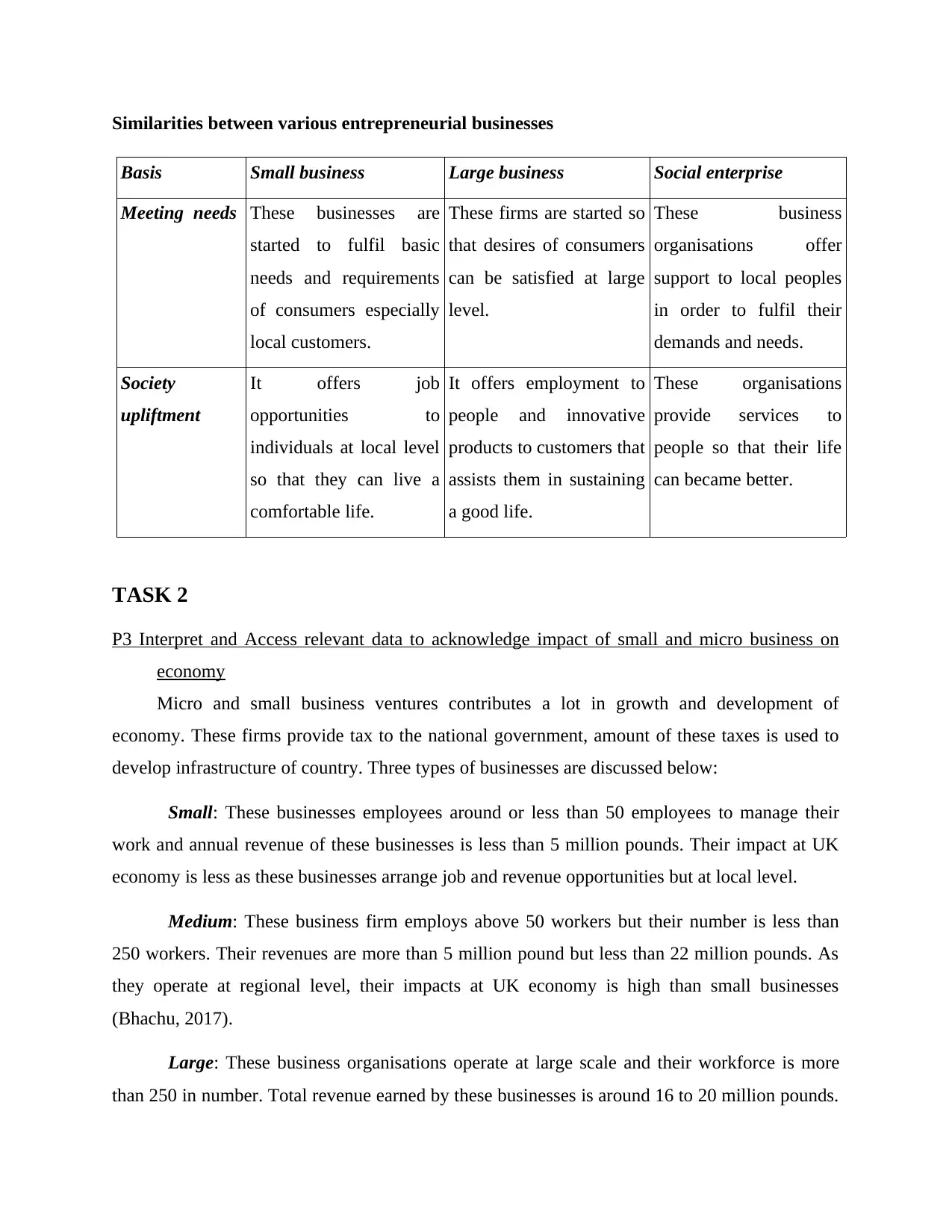
Similarities between various entrepreneurial businesses
Basis Small business Large business Social enterprise
Meeting needs These businesses are
started to fulfil basic
needs and requirements
of consumers especially
local customers.
These firms are started so
that desires of consumers
can be satisfied at large
level.
These business
organisations offer
support to local peoples
in order to fulfil their
demands and needs.
Society
upliftment
It offers job
opportunities to
individuals at local level
so that they can live a
comfortable life.
It offers employment to
people and innovative
products to customers that
assists them in sustaining
a good life.
These organisations
provide services to
people so that their life
can became better.
TASK 2
P3 Interpret and Access relevant data to acknowledge impact of small and micro business on
economy
Micro and small business ventures contributes a lot in growth and development of
economy. These firms provide tax to the national government, amount of these taxes is used to
develop infrastructure of country. Three types of businesses are discussed below:
Small: These businesses employees around or less than 50 employees to manage their
work and annual revenue of these businesses is less than 5 million pounds. Their impact at UK
economy is less as these businesses arrange job and revenue opportunities but at local level.
Medium: These business firm employs above 50 workers but their number is less than
250 workers. Their revenues are more than 5 million pound but less than 22 million pounds. As
they operate at regional level, their impacts at UK economy is high than small businesses
(Bhachu, 2017).
Large: These business organisations operate at large scale and their workforce is more
than 250 in number. Total revenue earned by these businesses is around 16 to 20 million pounds.
Basis Small business Large business Social enterprise
Meeting needs These businesses are
started to fulfil basic
needs and requirements
of consumers especially
local customers.
These firms are started so
that desires of consumers
can be satisfied at large
level.
These business
organisations offer
support to local peoples
in order to fulfil their
demands and needs.
Society
upliftment
It offers job
opportunities to
individuals at local level
so that they can live a
comfortable life.
It offers employment to
people and innovative
products to customers that
assists them in sustaining
a good life.
These organisations
provide services to
people so that their life
can became better.
TASK 2
P3 Interpret and Access relevant data to acknowledge impact of small and micro business on
economy
Micro and small business ventures contributes a lot in growth and development of
economy. These firms provide tax to the national government, amount of these taxes is used to
develop infrastructure of country. Three types of businesses are discussed below:
Small: These businesses employees around or less than 50 employees to manage their
work and annual revenue of these businesses is less than 5 million pounds. Their impact at UK
economy is less as these businesses arrange job and revenue opportunities but at local level.
Medium: These business firm employs above 50 workers but their number is less than
250 workers. Their revenues are more than 5 million pound but less than 22 million pounds. As
they operate at regional level, their impacts at UK economy is high than small businesses
(Bhachu, 2017).
Large: These business organisations operate at large scale and their workforce is more
than 250 in number. Total revenue earned by these businesses is around 16 to 20 million pounds.
⊘ This is a preview!⊘
Do you want full access?
Subscribe today to unlock all pages.

Trusted by 1+ million students worldwide
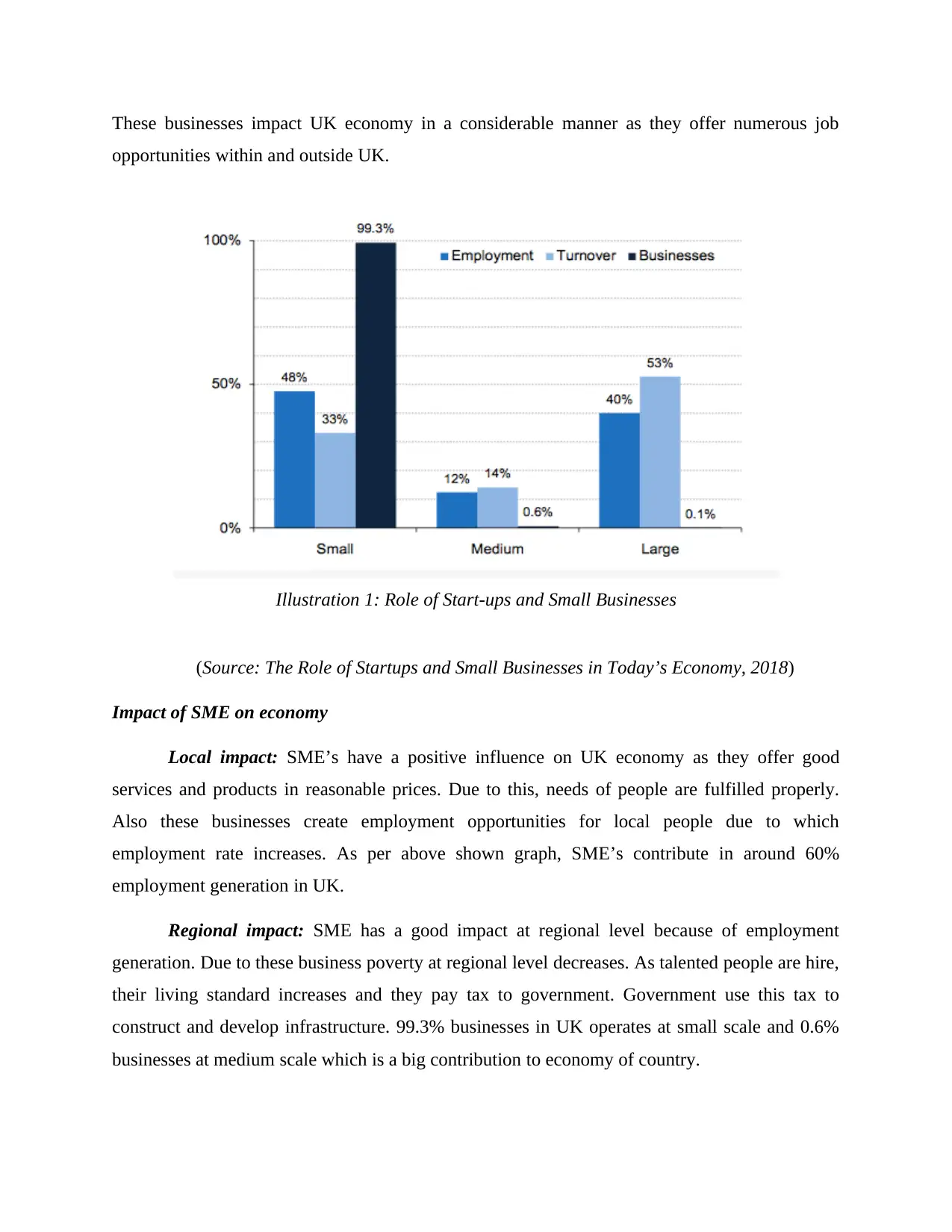
These businesses impact UK economy in a considerable manner as they offer numerous job
opportunities within and outside UK.
(Source: The Role of Startups and Small Businesses in Today’s Economy, 2018)
Impact of SME on economy
Local impact: SME’s have a positive influence on UK economy as they offer good
services and products in reasonable prices. Due to this, needs of people are fulfilled properly.
Also these businesses create employment opportunities for local people due to which
employment rate increases. As per above shown graph, SME’s contribute in around 60%
employment generation in UK.
Regional impact: SME has a good impact at regional level because of employment
generation. Due to these business poverty at regional level decreases. As talented people are hire,
their living standard increases and they pay tax to government. Government use this tax to
construct and develop infrastructure. 99.3% businesses in UK operates at small scale and 0.6%
businesses at medium scale which is a big contribution to economy of country.
Illustration 1: Role of Start-ups and Small Businesses
opportunities within and outside UK.
(Source: The Role of Startups and Small Businesses in Today’s Economy, 2018)
Impact of SME on economy
Local impact: SME’s have a positive influence on UK economy as they offer good
services and products in reasonable prices. Due to this, needs of people are fulfilled properly.
Also these businesses create employment opportunities for local people due to which
employment rate increases. As per above shown graph, SME’s contribute in around 60%
employment generation in UK.
Regional impact: SME has a good impact at regional level because of employment
generation. Due to these business poverty at regional level decreases. As talented people are hire,
their living standard increases and they pay tax to government. Government use this tax to
construct and develop infrastructure. 99.3% businesses in UK operates at small scale and 0.6%
businesses at medium scale which is a big contribution to economy of country.
Illustration 1: Role of Start-ups and Small Businesses
Paraphrase This Document
Need a fresh take? Get an instant paraphrase of this document with our AI Paraphraser

National impact: These businesses also impacts at national level due to payment of taxes
and other charges. Employment rate in UK due to SME’s is around 16 million that is 60% of
total private sector. These firms adopt innovative ideas and concepts to earn profits and for this
they require man power. Hence, overall employment rate in UK at national level is high (The
Role of Start-ups and Small Businesses in Today’s Economy).
and other charges. Employment rate in UK due to SME’s is around 16 million that is 60% of
total private sector. These firms adopt innovative ideas and concepts to earn profits and for this
they require man power. Hence, overall employment rate in UK at national level is high (The
Role of Start-ups and Small Businesses in Today’s Economy).
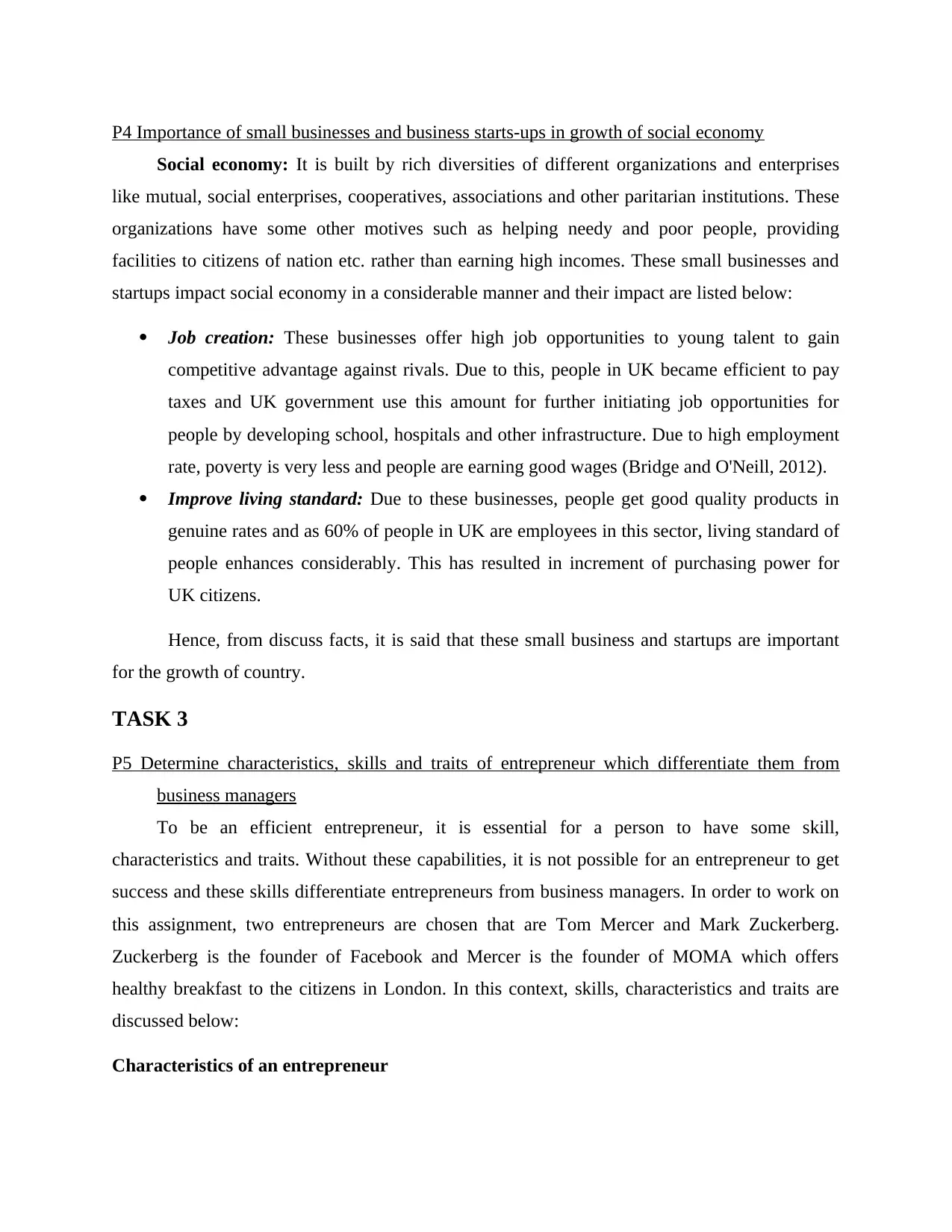
P4 Importance of small businesses and business starts-ups in growth of social economy
Social economy: It is built by rich diversities of different organizations and enterprises
like mutual, social enterprises, cooperatives, associations and other paritarian institutions. These
organizations have some other motives such as helping needy and poor people, providing
facilities to citizens of nation etc. rather than earning high incomes. These small businesses and
startups impact social economy in a considerable manner and their impact are listed below:
Job creation: These businesses offer high job opportunities to young talent to gain
competitive advantage against rivals. Due to this, people in UK became efficient to pay
taxes and UK government use this amount for further initiating job opportunities for
people by developing school, hospitals and other infrastructure. Due to high employment
rate, poverty is very less and people are earning good wages (Bridge and O'Neill, 2012).
Improve living standard: Due to these businesses, people get good quality products in
genuine rates and as 60% of people in UK are employees in this sector, living standard of
people enhances considerably. This has resulted in increment of purchasing power for
UK citizens.
Hence, from discuss facts, it is said that these small business and startups are important
for the growth of country.
TASK 3
P5 Determine characteristics, skills and traits of entrepreneur which differentiate them from
business managers
To be an efficient entrepreneur, it is essential for a person to have some skill,
characteristics and traits. Without these capabilities, it is not possible for an entrepreneur to get
success and these skills differentiate entrepreneurs from business managers. In order to work on
this assignment, two entrepreneurs are chosen that are Tom Mercer and Mark Zuckerberg.
Zuckerberg is the founder of Facebook and Mercer is the founder of MOMA which offers
healthy breakfast to the citizens in London. In this context, skills, characteristics and traits are
discussed below:
Characteristics of an entrepreneur
Social economy: It is built by rich diversities of different organizations and enterprises
like mutual, social enterprises, cooperatives, associations and other paritarian institutions. These
organizations have some other motives such as helping needy and poor people, providing
facilities to citizens of nation etc. rather than earning high incomes. These small businesses and
startups impact social economy in a considerable manner and their impact are listed below:
Job creation: These businesses offer high job opportunities to young talent to gain
competitive advantage against rivals. Due to this, people in UK became efficient to pay
taxes and UK government use this amount for further initiating job opportunities for
people by developing school, hospitals and other infrastructure. Due to high employment
rate, poverty is very less and people are earning good wages (Bridge and O'Neill, 2012).
Improve living standard: Due to these businesses, people get good quality products in
genuine rates and as 60% of people in UK are employees in this sector, living standard of
people enhances considerably. This has resulted in increment of purchasing power for
UK citizens.
Hence, from discuss facts, it is said that these small business and startups are important
for the growth of country.
TASK 3
P5 Determine characteristics, skills and traits of entrepreneur which differentiate them from
business managers
To be an efficient entrepreneur, it is essential for a person to have some skill,
characteristics and traits. Without these capabilities, it is not possible for an entrepreneur to get
success and these skills differentiate entrepreneurs from business managers. In order to work on
this assignment, two entrepreneurs are chosen that are Tom Mercer and Mark Zuckerberg.
Zuckerberg is the founder of Facebook and Mercer is the founder of MOMA which offers
healthy breakfast to the citizens in London. In this context, skills, characteristics and traits are
discussed below:
Characteristics of an entrepreneur
⊘ This is a preview!⊘
Do you want full access?
Subscribe today to unlock all pages.

Trusted by 1+ million students worldwide
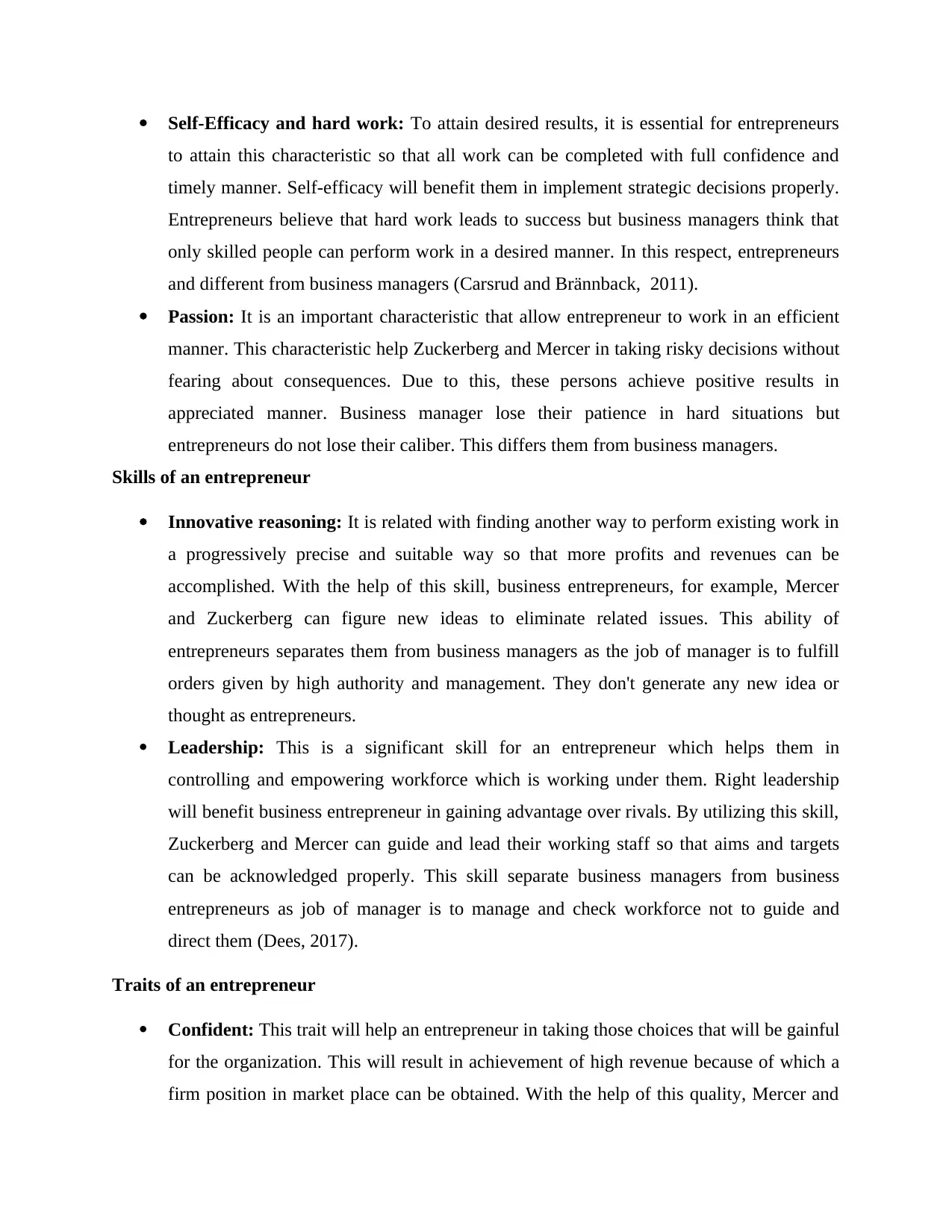
Self-Efficacy and hard work: To attain desired results, it is essential for entrepreneurs
to attain this characteristic so that all work can be completed with full confidence and
timely manner. Self-efficacy will benefit them in implement strategic decisions properly.
Entrepreneurs believe that hard work leads to success but business managers think that
only skilled people can perform work in a desired manner. In this respect, entrepreneurs
and different from business managers (Carsrud and Brännback, 2011).
Passion: It is an important characteristic that allow entrepreneur to work in an efficient
manner. This characteristic help Zuckerberg and Mercer in taking risky decisions without
fearing about consequences. Due to this, these persons achieve positive results in
appreciated manner. Business manager lose their patience in hard situations but
entrepreneurs do not lose their caliber. This differs them from business managers.
Skills of an entrepreneur
Innovative reasoning: It is related with finding another way to perform existing work in
a progressively precise and suitable way so that more profits and revenues can be
accomplished. With the help of this skill, business entrepreneurs, for example, Mercer
and Zuckerberg can figure new ideas to eliminate related issues. This ability of
entrepreneurs separates them from business managers as the job of manager is to fulfill
orders given by high authority and management. They don't generate any new idea or
thought as entrepreneurs.
Leadership: This is a significant skill for an entrepreneur which helps them in
controlling and empowering workforce which is working under them. Right leadership
will benefit business entrepreneur in gaining advantage over rivals. By utilizing this skill,
Zuckerberg and Mercer can guide and lead their working staff so that aims and targets
can be acknowledged properly. This skill separate business managers from business
entrepreneurs as job of manager is to manage and check workforce not to guide and
direct them (Dees, 2017).
Traits of an entrepreneur
Confident: This trait will help an entrepreneur in taking those choices that will be gainful
for the organization. This will result in achievement of high revenue because of which a
firm position in market place can be obtained. With the help of this quality, Mercer and
to attain this characteristic so that all work can be completed with full confidence and
timely manner. Self-efficacy will benefit them in implement strategic decisions properly.
Entrepreneurs believe that hard work leads to success but business managers think that
only skilled people can perform work in a desired manner. In this respect, entrepreneurs
and different from business managers (Carsrud and Brännback, 2011).
Passion: It is an important characteristic that allow entrepreneur to work in an efficient
manner. This characteristic help Zuckerberg and Mercer in taking risky decisions without
fearing about consequences. Due to this, these persons achieve positive results in
appreciated manner. Business manager lose their patience in hard situations but
entrepreneurs do not lose their caliber. This differs them from business managers.
Skills of an entrepreneur
Innovative reasoning: It is related with finding another way to perform existing work in
a progressively precise and suitable way so that more profits and revenues can be
accomplished. With the help of this skill, business entrepreneurs, for example, Mercer
and Zuckerberg can figure new ideas to eliminate related issues. This ability of
entrepreneurs separates them from business managers as the job of manager is to fulfill
orders given by high authority and management. They don't generate any new idea or
thought as entrepreneurs.
Leadership: This is a significant skill for an entrepreneur which helps them in
controlling and empowering workforce which is working under them. Right leadership
will benefit business entrepreneur in gaining advantage over rivals. By utilizing this skill,
Zuckerberg and Mercer can guide and lead their working staff so that aims and targets
can be acknowledged properly. This skill separate business managers from business
entrepreneurs as job of manager is to manage and check workforce not to guide and
direct them (Dees, 2017).
Traits of an entrepreneur
Confident: This trait will help an entrepreneur in taking those choices that will be gainful
for the organization. This will result in achievement of high revenue because of which a
firm position in market place can be obtained. With the help of this quality, Mercer and
Paraphrase This Document
Need a fresh take? Get an instant paraphrase of this document with our AI Paraphraser
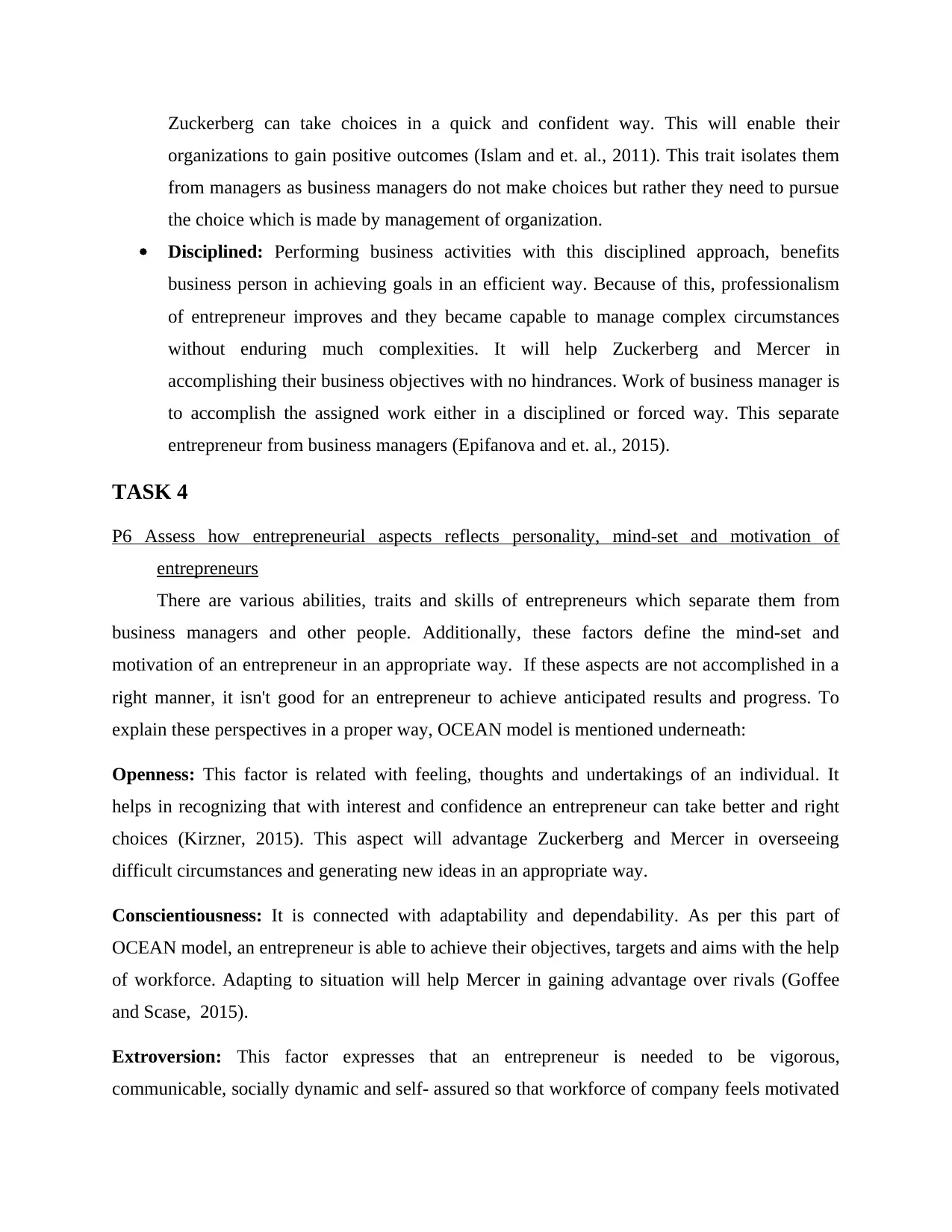
Zuckerberg can take choices in a quick and confident way. This will enable their
organizations to gain positive outcomes (Islam and et. al., 2011). This trait isolates them
from managers as business managers do not make choices but rather they need to pursue
the choice which is made by management of organization.
Disciplined: Performing business activities with this disciplined approach, benefits
business person in achieving goals in an efficient way. Because of this, professionalism
of entrepreneur improves and they became capable to manage complex circumstances
without enduring much complexities. It will help Zuckerberg and Mercer in
accomplishing their business objectives with no hindrances. Work of business manager is
to accomplish the assigned work either in a disciplined or forced way. This separate
entrepreneur from business managers (Epifanova and et. al., 2015).
TASK 4
P6 Assess how entrepreneurial aspects reflects personality, mind-set and motivation of
entrepreneurs
There are various abilities, traits and skills of entrepreneurs which separate them from
business managers and other people. Additionally, these factors define the mind-set and
motivation of an entrepreneur in an appropriate way. If these aspects are not accomplished in a
right manner, it isn't good for an entrepreneur to achieve anticipated results and progress. To
explain these perspectives in a proper way, OCEAN model is mentioned underneath:
Openness: This factor is related with feeling, thoughts and undertakings of an individual. It
helps in recognizing that with interest and confidence an entrepreneur can take better and right
choices (Kirzner, 2015). This aspect will advantage Zuckerberg and Mercer in overseeing
difficult circumstances and generating new ideas in an appropriate way.
Conscientiousness: It is connected with adaptability and dependability. As per this part of
OCEAN model, an entrepreneur is able to achieve their objectives, targets and aims with the help
of workforce. Adapting to situation will help Mercer in gaining advantage over rivals (Goffee
and Scase, 2015).
Extroversion: This factor expresses that an entrepreneur is needed to be vigorous,
communicable, socially dynamic and self- assured so that workforce of company feels motivated
organizations to gain positive outcomes (Islam and et. al., 2011). This trait isolates them
from managers as business managers do not make choices but rather they need to pursue
the choice which is made by management of organization.
Disciplined: Performing business activities with this disciplined approach, benefits
business person in achieving goals in an efficient way. Because of this, professionalism
of entrepreneur improves and they became capable to manage complex circumstances
without enduring much complexities. It will help Zuckerberg and Mercer in
accomplishing their business objectives with no hindrances. Work of business manager is
to accomplish the assigned work either in a disciplined or forced way. This separate
entrepreneur from business managers (Epifanova and et. al., 2015).
TASK 4
P6 Assess how entrepreneurial aspects reflects personality, mind-set and motivation of
entrepreneurs
There are various abilities, traits and skills of entrepreneurs which separate them from
business managers and other people. Additionally, these factors define the mind-set and
motivation of an entrepreneur in an appropriate way. If these aspects are not accomplished in a
right manner, it isn't good for an entrepreneur to achieve anticipated results and progress. To
explain these perspectives in a proper way, OCEAN model is mentioned underneath:
Openness: This factor is related with feeling, thoughts and undertakings of an individual. It
helps in recognizing that with interest and confidence an entrepreneur can take better and right
choices (Kirzner, 2015). This aspect will advantage Zuckerberg and Mercer in overseeing
difficult circumstances and generating new ideas in an appropriate way.
Conscientiousness: It is connected with adaptability and dependability. As per this part of
OCEAN model, an entrepreneur is able to achieve their objectives, targets and aims with the help
of workforce. Adapting to situation will help Mercer in gaining advantage over rivals (Goffee
and Scase, 2015).
Extroversion: This factor expresses that an entrepreneur is needed to be vigorous,
communicable, socially dynamic and self- assured so that workforce of company feels motivated
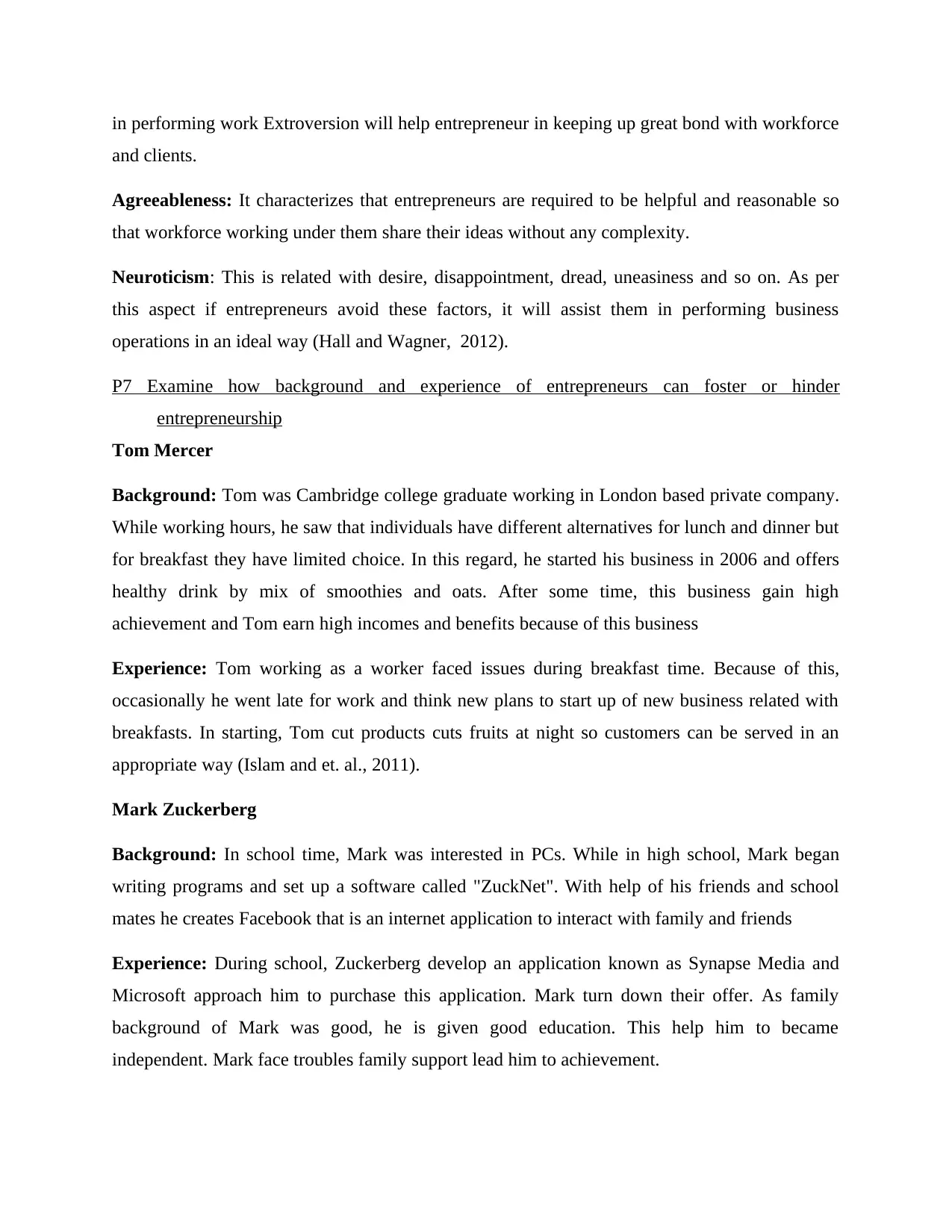
in performing work Extroversion will help entrepreneur in keeping up great bond with workforce
and clients.
Agreeableness: It characterizes that entrepreneurs are required to be helpful and reasonable so
that workforce working under them share their ideas without any complexity.
Neuroticism: This is related with desire, disappointment, dread, uneasiness and so on. As per
this aspect if entrepreneurs avoid these factors, it will assist them in performing business
operations in an ideal way (Hall and Wagner, 2012).
P7 Examine how background and experience of entrepreneurs can foster or hinder
entrepreneurship
Tom Mercer
Background: Tom was Cambridge college graduate working in London based private company.
While working hours, he saw that individuals have different alternatives for lunch and dinner but
for breakfast they have limited choice. In this regard, he started his business in 2006 and offers
healthy drink by mix of smoothies and oats. After some time, this business gain high
achievement and Tom earn high incomes and benefits because of this business
Experience: Tom working as a worker faced issues during breakfast time. Because of this,
occasionally he went late for work and think new plans to start up of new business related with
breakfasts. In starting, Tom cut products cuts fruits at night so customers can be served in an
appropriate way (Islam and et. al., 2011).
Mark Zuckerberg
Background: In school time, Mark was interested in PCs. While in high school, Mark began
writing programs and set up a software called "ZuckNet". With help of his friends and school
mates he creates Facebook that is an internet application to interact with family and friends
Experience: During school, Zuckerberg develop an application known as Synapse Media and
Microsoft approach him to purchase this application. Mark turn down their offer. As family
background of Mark was good, he is given good education. This help him to became
independent. Mark face troubles family support lead him to achievement.
and clients.
Agreeableness: It characterizes that entrepreneurs are required to be helpful and reasonable so
that workforce working under them share their ideas without any complexity.
Neuroticism: This is related with desire, disappointment, dread, uneasiness and so on. As per
this aspect if entrepreneurs avoid these factors, it will assist them in performing business
operations in an ideal way (Hall and Wagner, 2012).
P7 Examine how background and experience of entrepreneurs can foster or hinder
entrepreneurship
Tom Mercer
Background: Tom was Cambridge college graduate working in London based private company.
While working hours, he saw that individuals have different alternatives for lunch and dinner but
for breakfast they have limited choice. In this regard, he started his business in 2006 and offers
healthy drink by mix of smoothies and oats. After some time, this business gain high
achievement and Tom earn high incomes and benefits because of this business
Experience: Tom working as a worker faced issues during breakfast time. Because of this,
occasionally he went late for work and think new plans to start up of new business related with
breakfasts. In starting, Tom cut products cuts fruits at night so customers can be served in an
appropriate way (Islam and et. al., 2011).
Mark Zuckerberg
Background: In school time, Mark was interested in PCs. While in high school, Mark began
writing programs and set up a software called "ZuckNet". With help of his friends and school
mates he creates Facebook that is an internet application to interact with family and friends
Experience: During school, Zuckerberg develop an application known as Synapse Media and
Microsoft approach him to purchase this application. Mark turn down their offer. As family
background of Mark was good, he is given good education. This help him to became
independent. Mark face troubles family support lead him to achievement.
⊘ This is a preview!⊘
Do you want full access?
Subscribe today to unlock all pages.

Trusted by 1+ million students worldwide
1 out of 15
Related Documents
Your All-in-One AI-Powered Toolkit for Academic Success.
+13062052269
info@desklib.com
Available 24*7 on WhatsApp / Email
![[object Object]](/_next/static/media/star-bottom.7253800d.svg)
Unlock your academic potential
Copyright © 2020–2026 A2Z Services. All Rights Reserved. Developed and managed by ZUCOL.





